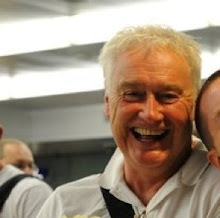
I think Jeremy Hardy’s show was very good. Every time I woke up, people seemed to be laughing.
That’s a slight exaggeration of course but despite the fact I’m a big Jeremy Hardy fan and try never to miss his appearances on radio, two and a half hours is a long set for any stand-up comedian, and Hardy doesn’t have the hyperactive stage presence of a Michael McIntyre or Lee Evans to keep the joint jumping. Nor as an observational comedian does he have a bottomless inventory of veteran jokes like Ken Dodd whose first notebook must date from Methuselah’s schooldays.
Indeed, in super-sedate Richmond-on-Thames “it’s really South London but you all probably think it’s still Surrey” and a house filled by his core audience of Men With Partings and Women in Husky Jackets, it’s surprising there wasn’t a little more light dozing going on.
It started well enough with topical remarks about Nick Clegg concealing his smoking habit from the children, and he tested the audience’s receptiveness to his foul-mouthed delivery as an alternative to his somewhat modulated Radio 4 appearances. They lapped it up, F-word C-word and all.
He struck at his usual political soft targets including Vince Cable “tasked with shafting the poor in their own accent” and a neat suggestion that after her demise, Tony Blair might bask in her reflected glory by lauding Lady Thatcher as “The People’s Pinochet”, but the newish Coalition team didn’t seem to provide the same range of hairy old coconuts as New Labour, and some of his balls fell short.
Hardy is the first to acknowledge he’s not a household name, and that his stature and Marks and Spencer beige dress sense are as far from celebrity ‘stage presence’ as you can get. When his material is sharp and topical, it doesn’t matter, but after the interval the Marxist political points were diluted and the anecdotes less ordered – several times he asked the audience ‘what was I talking about?’ and often between the several hundred of us we couldn’t come up with the answer.
Later still, he began to reminisce about his political activism and ramble about his Streatham-dwelling Waitrose-shopping domesticity, so it all felt a bit like Billy Bragg’s dad telling you the highlights of his Saga holiday.
Top priced tickets for the show were around £28, and Hardy’s subversism ran only to saying he thought this show was “worth about £14.75” but not encouraging the audience to storm the box office for refunds.
Mark Thomas would have done.









